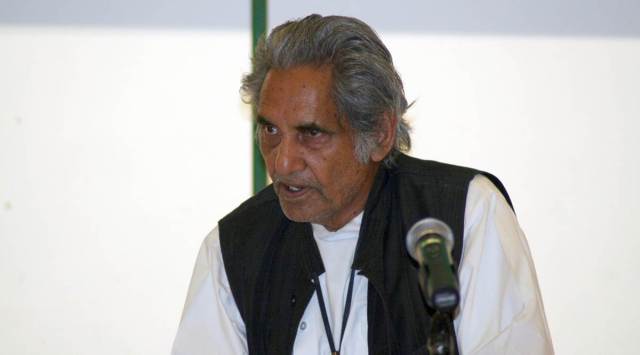- India
- International
Remembering Gopaldas Neeraj: The man who immortalised common man’s plight
Neeraj’s song in films added to his popularity. But he continued with his style even while writing songs for films
 Neeraj had feelings for common man, he felt for their pain and sufferings and this reflected in his writing in form of ‘love’. (Source: Wikimedia Commons)
Neeraj had feelings for common man, he felt for their pain and sufferings and this reflected in his writing in form of ‘love’. (Source: Wikimedia Commons) Swapn jhare phool se,
Meet chubhe shool sey,
Lut gaye singaar sabhi,
Baagh ke babool se,
Aur ham khade khade bahaar dekhte rahe,
Karwaan guzar gaya, ghubaar dekhte rahe.
More than five decades have passed since these lines were written by Gopaldas Neeraj for the movie Nayi Umar ki Nayi Fasal. It is hard to find everything in one song — covetousness, philosophy, struggle, remorse, dream, hope, all intertwined beautifully in one song.
This was possible only by Neeraj, the poet whose lyrics flowed as if they were meant for rhythmic melody. A poet who pioneered the Hindustani ghazal which easily connected with the masses. Today is Neeraj’s 96th birth anniversary. A poet who got Padma Shri (1991) and Padma Bhushan (2007), Yash Bharti (1994) and three Filmfare awards (1970-71 & 72). He also headed the Uttar Pradesh Bhasha Sansthan during Akhilesh Yadav’s regime and was provided ministerial status.
In 2017, Neeraj had just returned from the hospital. I visited his place in Aligarh for wishing him on his birthday. Age had made him weak but his voice still resonated. The walls of the room had several pictures, mostly of him at kavi sammelans and receiving awards. His Padma awards, too, shared space on the wall. Apart from Neeraj, his son Pradeep discussed his father’s poetry as it was difficult for him to talk. Pradeep, an engineering graduate from AMU, is also a poet.
India has seen several stalwart poets who had their own significance and natural style of rendering poems. But undoubtedly, Neeraj had feelings for the common man; he felt for their pain and sufferings and this reflected in his writing in form of ‘love’.

Like several other poets, Neeraj, too, had a life marked with poverty and struggle. Born in Etah, he had to look for odd jobs and worked as a typist in Etawah. But the poet in him was restless. Since his teenage, Neeraj started writing poetry and sharing stage, at times with stalwarts who were mesmerised with the poems of this young man. There are incidents where he used to write poems with another pseudonym, ‘Bhavuk Etahvi’. But once he reached the stage of kavi sammelan, there was no looking back for this greatest Hindi poet of all genre.
In his early life, Neeraj had to change jobs and moved from one city to another but his penchant for writing poems continued. Finally, he settled in Aligarh after his appointment in Dharam Samaj College as a teacher. He made his home in the city. At Aligarh Muslim University, Neeraj had a good relationship with Shaharyar, another legendary poet who had given immortal ghazals in the film Umrao Jaan.
Neeraj had penned several immortal songs for Bollywood movies. But prior to that, he was already a well-known name in the literary circle. In 1955, his Ghazal Karwan Guzar Gaya was aired on radio, and in 1966, it was included in the film Nayi Umar ki Nayi Fasal. The song was a huge hit among the masses and Neeraj’s name was most sought after among the Bollywood directors. For musicians like SD Burman, Shankar Jai Kishan, actor producers like Dev Anand and Raj Kapur, Neeraj became an eminent choice.
Neeraj’s song in films added to his popularity. But he continued with his style even while writing songs for films. Rhythm was a hallmark of his poetry which passed on to his songs. There were incidents where Neeraj himself recited his songs so that musicians may easily develop the tune. Just sample this — Phoolo ke rang se/dil ki qalam se/tujhko likh roz paati/kaise bataun/kis kis tarah se/pal pal mujhe tu satati — for the film Prem Pujari, anyone can easily identify and attribute it to Neeraj due to its rhythm class.
Songs like Kaal ka pahiya ghoome re bhaiyya (Chanda aur Bijli), Bas yahi apradh main har baar karta hoon (Pehchaan) and Aey bhai! Zara dekh ke chalo (Mera Naam Joker) — they all reflect the spiritual side of Neeraj where he felt the sufferings of people to the core of his heart. He had an influence of Sri Aurbindo and it flows in his poetry.
Associate Professor, Department of Hindi, Aligarh Muslim University, Ajay Bisaria had a close association and often visited Neeraj’s residence in Aligarh. Bisaria feels Neeraj had developed his own style. “Words flew to him in a rhythmic manner on their own, it is very difficult for others. He had mastery over words,” Bisaria said. When Neeraj entered the scene, Harivansh Rai Bachchan was already an established name on the stage. However, Neeraj carved his way and touched people’s hearts. “His poems gave new life to romanticism which was coupled with spiritualism. Neeraj used words which are often spoken around Aligarh and they were well-received,” he added.
Times were changing quickly. India was independent and the migration from rural to urban areas had started. The flock that shifted base had ambitions and was still attached to the roots, and carried with them the social norms. Neeraj’s poems came as a relief. At times, they dismantled the established old taboos and on other occasions, they rightfully reflected a person’s sense of belonging. “The tension between society and individual was going on among everyone. Neeraj captured it beautifully with romanticism and also reflected the loneliness,” Bisaria said.
Neeraj knew Urdu well and cultivated his own style. He used words even from Sanskrit and touched the softness of the Hindi Khadi Boli. The poems were rendered with such eloquence that they were immediately on everyone’s lips. Neeraj’s simplicity was evident in his lifestyle. “He lived a simple life, he understood common people, their sufferings and he lived as if he was one of them, playing cards with them, smoking beedi and wearing simple clothes. Anybody was welcome in his home,” Bisaria said.
On July 19, 2018, Neeraj breathed his last.
For more lifestyle news, follow us: Twitter: lifestyle_ie | Facebook: IE Lifestyle | Instagram: ie_lifestyle
Apr 24: Latest News
- 01
- 02
- 03
- 04
- 05



































